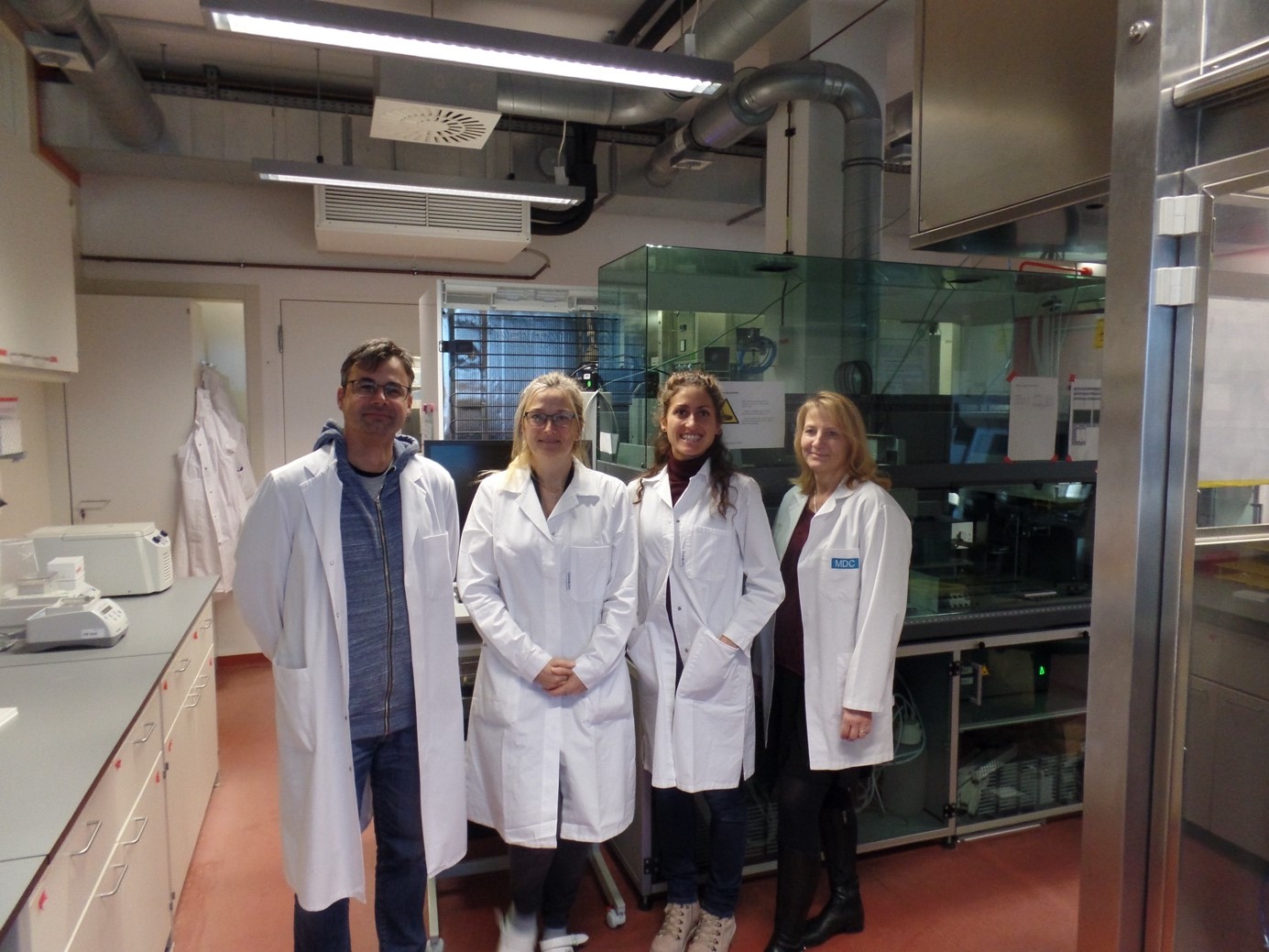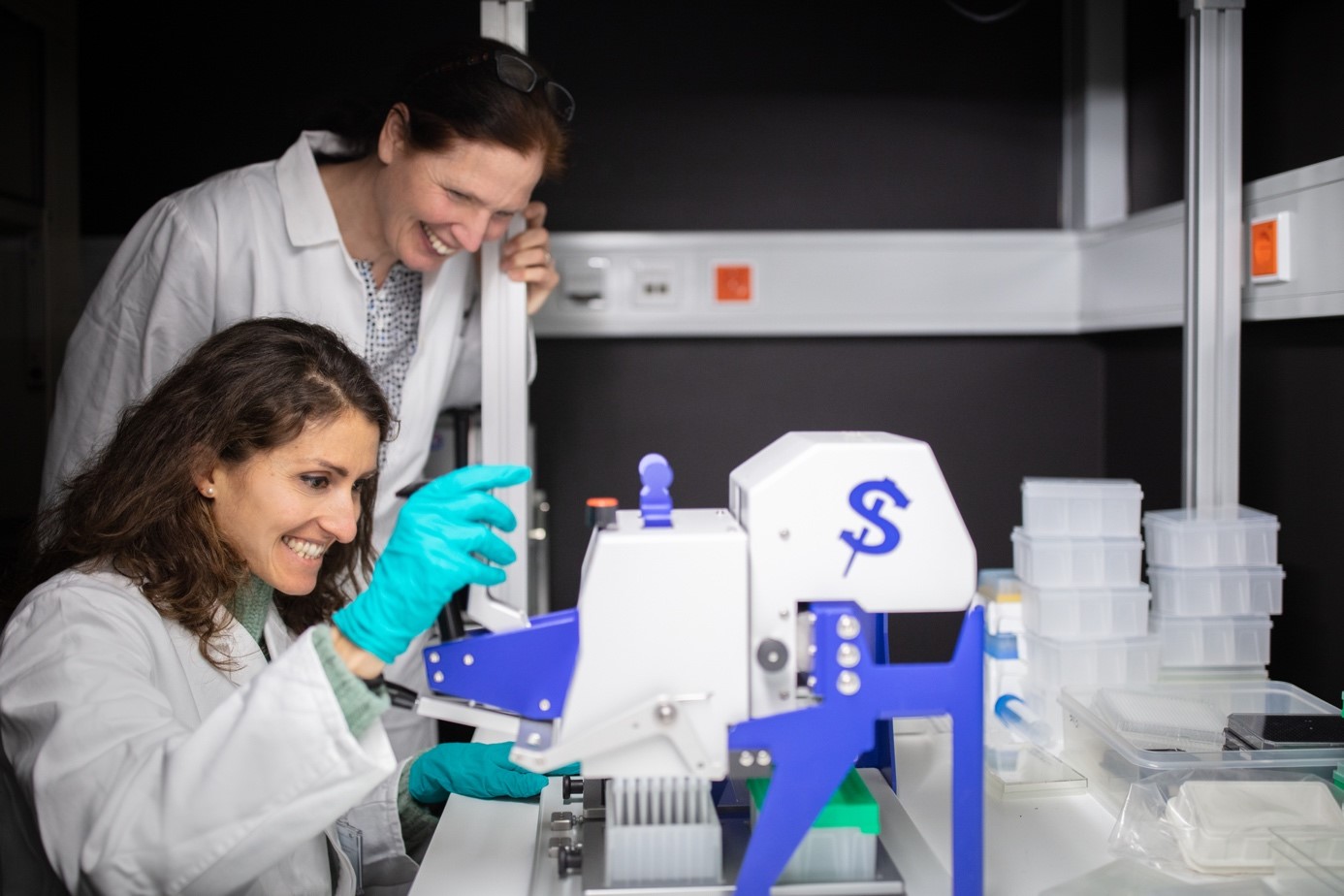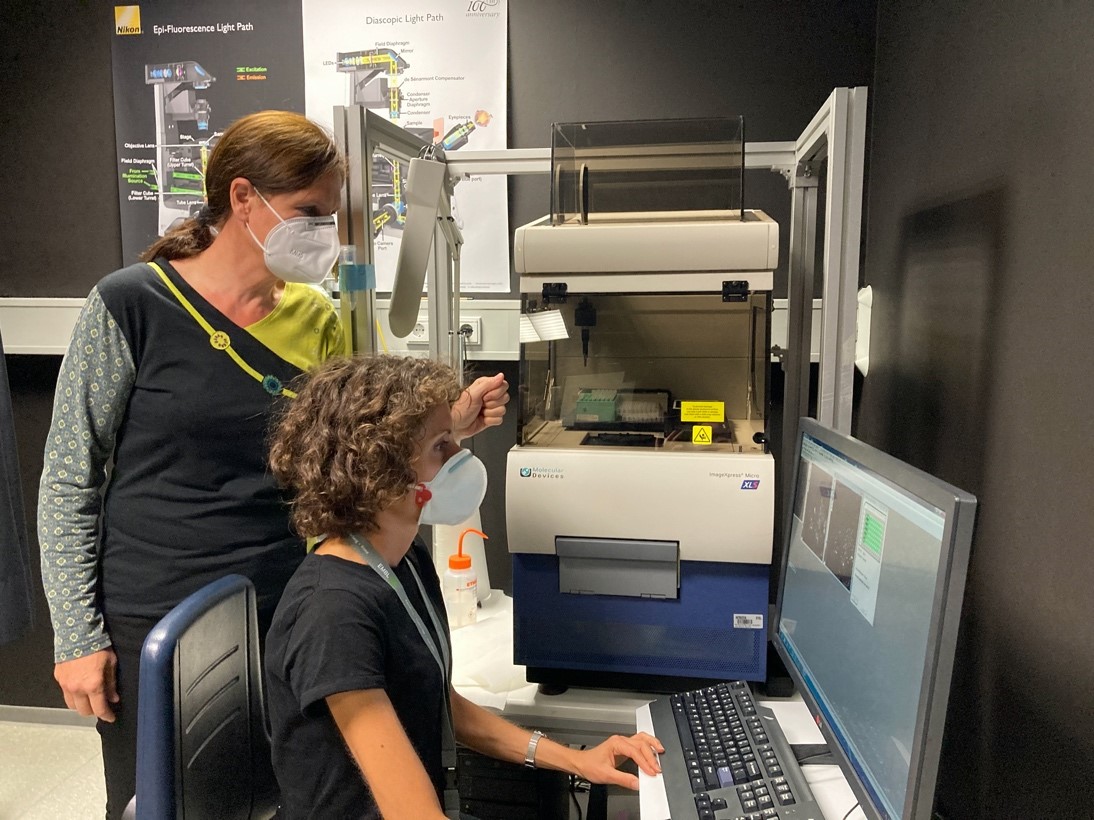Conducting interdisciplinary transnational research in the COVID-19 era
Published: 2020-11-10
The COVID-19 pandemic has made it more difficult for researchers to travel from one country to another, slowing down cross-border cooperation. It has forced laboratories worldwide to adapt stringent safety and hygiene measures, and has even had an impact on the focus of some research projects. But some researchers, like Euro-BioImaging user, Roberta Ranieri, of the University of Perugia, are unstoppable. Despite the possibility of travel restrictions being reintroduced at any moment, she returned to Euro-BioImaging’s EMBL Node (ALMF) in September 2020 to complete microscopy work funded by the Horizon 2020 CORBEL project that was interrupted in March by the Corona Virus lockdown.
Roberta Ranieri has a unique scientific background, in cancer biology investigation and drug development methods. In 2017 she was awarded a PhD fellowship at the Department of Medicine of the University of Perugia, Italy, under the supervision of Professor Maria Paola Martelli. Professor Martelli focuses her research on acute myeloid leukemia (AML) with the aim to translate findings into novel diagnostic tools and therapies. AML accounts for about 80% of acute leukemia in adults with a grim prognosis in particular for elderly patients, often leaving allogeneic stem cell therapy as the only treatment option. Under the supervision of Professor Martelli, Roberta’s job is to build on her previous experience in cell biology and drug discovery in order to perform high throughput screening of drugs/compounds that could be effective against AML.
This complex, interdisciplinary mission was aided by the Horizon 2020-funded CORBEL project, that connected Professor Martelli and her student, Roberta Ranieri, with two European Life Science Research Infrastructures, EU-OPENSCREEN and Euro-BioImaging.
As Professor Maria Paola Martelli explains, “CORBEL allowed us access to technologies not available in our lab and to scale-up screening of large compound libraries.”
Roberta adds, “We knew what we wanted to do, our laboratory just didn’t have the expertise to do it.” That’s where the European research infrastructures step in. EU-OPENSCREEN is the premier European technology and expertise platform for chemical biology and the first stop for any academic researcher in the life sciences interested in developing specific chemical tools to target their protein of interest. They offer access to academic high-throughput screening facilities and medicinal chemistry groups in eight European countries. Euro-BioImaging provides open access to biological and biomedical imaging instruments in 20+ Nodes across Europe. All scientists, regardless of their affiliation, area of expertise or field of activity can benefit from these pan-European open access services, which are provided with high quality standards by leading facilities across Europe.
The first set of experiments was carried out by Roberta Ranieri at the EU-OPENSCREEN FMP Node in Berlin in 2018. Access to EU-OPENSCREEN allowed her to screen their collection of 40,000+ relevant compounds against AML cell lines.

Roberta Ranieri’s visit to EU-OPENSCREEN in Berlin allowed her to screen 40,000 drug compounds – and learn important skills.
Over 700 chemical compounds were deemed possible candidates for targeting ALM. Roberta spent the next year screening these compounds with the team in her lab in Perugia, thanks to the newly acquired expertise she had gained in Berlin.

Setting up the second phase of screening at Euro-BioImaging’s EMBL Node. Photo copyright: EMBL/Kinga Lubowiecka.
After this second screening, two FDA approved drugs proved to be highly effective in their cell models and profitably synergistic with drugs already in use in the AML settings. Those promising compounds were to be evaluated using advanced imaging technologies at the Euro-BioImaging EMBL Node in Heidelberg in the next phase of the project.
But this important research was slowed down by the corona virus pandemic and ensuing lockdown.
Roberta’s first visit to EMBL, in February 2020, to set up the screening went well. But her second visit, a month later, to accomplish the screening work, was brutally interrupted, as the entire world went into lockdown. After merely 2 days in the lab, Roberta was forced into quarantine, in the small AirBnB apartment she had rented. Kind people in the neighboring apartment brought her food. After two weeks in isolation, she was allowed to travel back to her home in Perugia, where she underwent a second two-week quarantine.
But Roberta didn’t let this traumatic experience stop her. In September 2020, she returned to EMBL to complete her project.
“Being able to travel to EMBL as a Euro-BioImaging user was important because the wide-field microscope I used at EMBL is very powerful and allowed me to analyze the effect of a lot of drugs on my cell model very quickly,” explains Roberta. “In addition, the EMBL team helped me with sample preparation and image analysis. I had no experience in either of these fields. The scientists were very involved in my project. They are experts in their field and I learned so much. We worked together to design a pipeline for data analysis, based on our cell line and signal.”

Undeterred by travel restrictions, Roberta Ranieri, returns to Euro-BioImaging’s EMBL Node (ALMF) in September 2020 to complete microscopy work within the CORBEL project that was interrupted in March 2020 by the Corona Virus lockdown.
After one month in Heidelberg, Roberta returned to Italy, just before new travel restrictions as a result of growing numbers of corona virus cases were rolled out across Europe.
Roberta’s story is a compelling example of what it is like to do research in 2020. It demonstrates how important European collaboration is to complex science, and the negative impact the pandemic can have on this type of collaboration.
Back in her lab in Italy, Roberta will now concentrate on the next phase of her research. The CORBEL project allowed her and the team at the University of Perugia to obtain a huge amount of results and scientific information in an extremely short time and to learn from experts the best strategies for drug screening and image analysis. It made connections between several European scientists, that both increased the impact of their research, as well as building friendships and collaborations.
Despite the pandemic, a lockdown, and constantly-evolving travel restrictions, Professor Martelli and her team are now hopefully one step closer to novel therapy options for AML, which are desperately needed.
Roberta Ranieri would like to thank:
- Prof. Martelli's laboratory group, Department of Medicine of University of Perugia;
- CORBEL project grant to Prof. Maria Paola Martelli;
- CORBEL project Italian team: Ilaria Gionfriddo and Roberta Ranieri;
- CORBEL project Research infrastructure 1: Screening Unit of Leibniz-FMP coordinated by Jens Peter von Kries, EU-OPENSCREEN, Berlin;
- CORBEL project FMP team: Sabrina Kleissle, Peggy Treffkorn, Martin Neuenschwander;
- CORBEL project Research infrastructure 2: Advanced Light Microscopy Facility (ALMF), EMBL, coordinated by Rainer Pepperkok, EURO-BIOIMAGING Node, Heidelberg;
- CORBEL project ALMF-EMBL team: Beate Neumann, Christian Tischer;
- Special thanks to: Tanja Miletic, Frauke Leitner, Katja Herzog and Sonja Hansen (CORBEL staff) Claudia Martin (EICAT, EMBL).